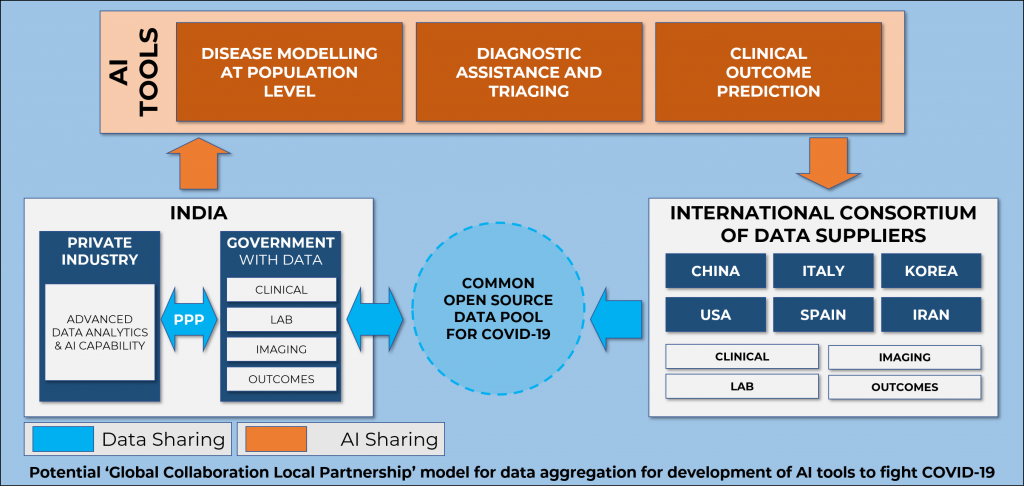The India Disadvantage
No matter what one chooses to believe, one thing is certain – we have a completely new disease out there, one which is very virulent and hence will possibly affect almost every citizen of India in some way or the other. India’s healthcare system even without Coronavirus (or COVID-19) is completely overburdened – long queues outside hospitals are not uncommon and even during a normal working day, sadly, apart from the wards, corridors in our Government hospitals are used for taking care of patients. Now imagine what will happen when this new disease makes its course through our already overburdened healthcare system – entire India taking a ‘flu leave’ within the span of a month! One is only limited by their imagination as to the chaos that might ensue – we must not only defend against COVID-19 but need to take the fight to it, simply for our very survival!
The India Advantage
The Government realises this grave threat that COVID-19 presents to India’s medical and economic health and has hence taken some strong policy decisions to help delay and contain the spread of COVID-19 through the country. For example, completely restricting the entry of foreign nationals has widespread implications and one can only imagine how difficult it must have been for the Government to take such a decision. The silver lining is that since India has one of the lowest number of cases globally, we are in an interesting position where not only can we learn from countries’ experiences, but also use their data to our advantage.
A Prophetic Solution Already Proposed?
On Feb 1, 2020, during her budget speech, our Honourable Finance Minister, Mrs. Nirmala Sitharaman stated
“…setting up hospitals in the PPP mode. In the first phase, those Aspirational Districts will be covered, where presently there are no Ayushman empanelled hospitals...Using machine learning and AI, in the Ayushman Bharat scheme, health authorities and the medical fraternity can target disease…”
The statement that the Government will partner with private industry in areas where the Government is lacking or is unable to provide services, combined with the view that machine learning and Artificial Intelligence (AI) would be imperative for providing healthcare services to India’s masses, is precisely what is needed today. While the Government partnering with private players to expand testing and treatment for COVID-19 is being extensively discussed and debated today, it seems that everyone has forgotten Indian private sector’s computer science expertise, especially in the domains of AI and machine learning!
There are innumerable engineers in Indian R&D centres of global giants such as GE, Philips, Siemens, Google and Microsoft working on AI. Add to that the ever-growing list of deep technology start-ups and research groups working in AI for healthcare and you have a ready eco-system of specialists who can help create AI tools to fight COVID-19. The Government needs to immediately explore partnerships with such players, provide them appropriate data, and essentially do a Public-Private-Partnership for Data Analytics and AI.
The following three-pronged approach is suggested:

(A) Open-Source all Indian COVID-19 Data Immediately
More than 6,500 RT-PCR tests have been conducted for COVID-19 in India as on date, and around ~115 patients have been confirmed. All clinical data, imaging data (including raw dicom files for X-Rays and CT Scans), laboratory data, RTPCR & viral genomics data and treatment outcomes data should be immediately open-sourced and made available to researchers. Once done, the process of developing AI can be started immediately. The Government already has great examples of open-sourcing data, such as CSIR’s Indegene Project.
(B) Lead a Global Collaboration for Data Consolidation
AI systems rely on ‘learning’ from pre-existing data and India has a unique opportunity to use AI in the fight against COVID-19 since a full-blown outbreak seems a few weeks away. Since Indian data alone would be insufficient to create robust clinically applicable AI systems, we must use the time we have to take the lead in sparking a global collaboration for consolidation of patient-level COVID-19 data. Countries from around the world can contribute anonymised patient data to central databases which can be accessed by researchers across India and the world.
(C) Onboard Industry Partners
After making the data available, the Government can expect a huge response from all shapes and sizes of AI developers. There will have to be strong performance benchmarks and automated evaluation systems to first determine the best AI tools, and subsequently onboard them. Below are some examples of high-impact AI tools which can be built quickly:
(a) Predicting COVID-19 progression at population levelto create detailed disease models to drive health policy and infrastructure readiness related decisions.
(b) Diagnosing COVID-19 using medical imaging-based AI techniques making highly trained specialist doctors more effective and efficient.
(c) Predicting clinical outcomes in diagnosed patients helping determine which patients will require critical care, improving resource allocation.
Summary
Given that that our already overworked healthcare services industry will be strained to a great extent when COVID-19 spreads across the country, we must use all options available to fight. Partnering with industry for developing advanced data analytics and AI tools in a Public-Private-Partnership format provides an effective way to initiate the development of ‘first-in-the-world’ tools to predict, diagnose and prognosticate, and thereby fight COVID-19. But it will not be easy since the development of such tools relies on access to patient-level data, enough of which is not available in India. Hence, the Government would need to devise collaborations focused on data sharing with countries that have more cases of COVID-19 than India, enabling Indian AI experts to create meaningful, accurate yet quick solutions to fight this war. My research focuses almost exclusively on the evaluation and subsequent deployment of AI systems and all our tools/resources are at the country’s disposal.
Author
Dr. Vidur Mahajan, MBBS, MBA
Head of R&D,
Centre for Advanced Research in
Imaging, Neurosciences & Genomics (CARING),
New Delhi, India
